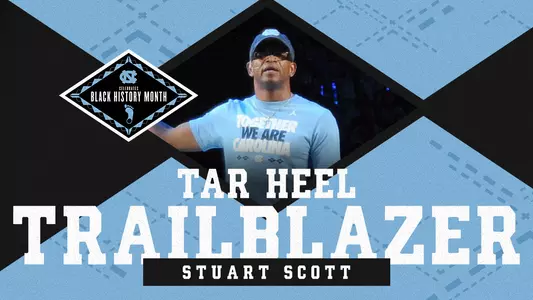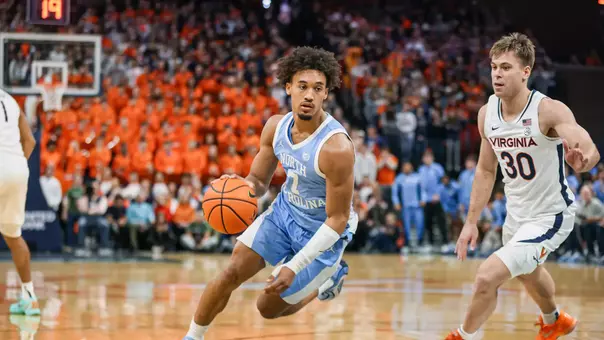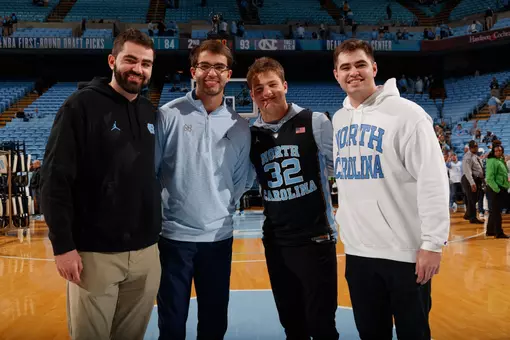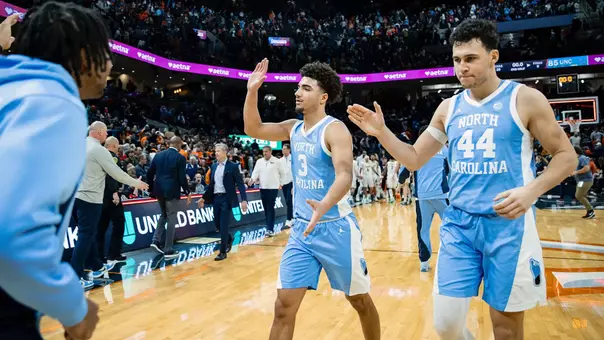University of North Carolina Athletics

Lucas: Passion Defined Scott
January 4, 2015 | Men's Basketball, Featured Writers, Adam Lucas
Update, Feb. 2019:
In celebration of Black History Month, GoHeels.com will take a look back at each of the Tar Heel Trailblazers honored since 2014, with updates by Pat James.
Four years after losing his battle with cancer, Stuart Scott continues to inspire and be honored through the Stuart Scott Memorial Cancer Research Fund and the Stuart Scott ENSPIRE Award.
The V Foundation for Cancer Research has awarded nearly $8 million from the Stuart Scott Fund since its 2015 inception. That money has funded 23 grants at 17 cancer centers nationwide to support research dedicated to the aggressiveness, therapeutic responsiveness and outcomes experienced by cancer patients from diverse ethnic populations, according to the V Foundation. It also supports researchers from minority populations.
The Stuart Scott ENSPIRE Award celebrates individuals and originations that have taken risk and used an innovative approach to helping the disadvantaged through the power of sports. Learn more about previous honorees here.
By Adam Lucas
Every single time Stuart Scott hosted Late Night with Roy Williams, you knew it was coming. You didn't know exactly when, or exactly what might prompt it, but at some point, you knew the ESPN anchor would walk to center court at the Smith Center, and that's when you would see exactly who he really was.
That's when Scott would usually reach down, touch the interlocking "NC" at midcourt, and say, "This is what it's all about. This right here. It's on the floor, it's on your shirt, and it's in your heart."
Scott made it obvious at every opportunity that it was in his heart, too. Too much attention was paid to the way he talked. Nationally, maybe people knew him because he said "Booyah!" or because he had some cool turns of a phrase. Here in Chapel Hill, we knew him because he was a Tar Heel, because he felt the exact same way about this place that we did…and because he went on to do things around the world and seeing the biggest stories in sports never changed his opinion that Chapel Hill was home.
He attended the first game in the Smith Center, a 1986 battle against Duke, as a fan. He was there when Maryland and Len Bias defeated the Tar Heels later that same season. "Bias torched us," he said with a shake of his head 20 years later, as if the pain of the defeat was still fresh.
He'd grown up in Winston-Salem pretending to be Phil Ford. Scott and his brother would cut the bottom out of a Carolina cup and tape it to the top of a doorway. They'd wrap a napkin in aluminum foil and play entire make-believe games in which they filled the roles of the complete Carolina roster. Ford, unfailingly, was the high scorer.
Scott's sister met Ford on campus in the late 1970s. "My brother Stuart cried when you lost to Marquette in the 1977 championship game," she told him.
"I did, too," Ford said, and you got the feeling that wasn't the only time that Stuart Scott and Phil Ford had shared the same passion for the University of North Carolina.
"No matter where you go, no matter where you've been, when you go home, it touches your heart," Scott said during a recent Late Night visit. "When you go to school here, 25 or 30 years later you are still a Tar Heel. You meet a Tar Heel anywhere in the world and there's an immediate, 'Hey, you went to Carolina!' connection."
And so that's why Scott was a natural choice for the hosting role at Late Night. At first, it seemed like a slightly odd pairing. Roy Williams, the traditional coach, the self-proclaimed hater of cool, with Stuart Scott, who took cool national every night on SportsCenter?
But Williams didn't care about the catchphrases or the lingo. He cared about the way Scott felt about Carolina, and it was obvious that the two individuals felt exactly the same way.
"The last few years showing up to our Late Night, handling our Late Night celebration for eight or nine years, was just one of the true gifts that I was fortunate to be involved in," Williams said on Sunday. "The fun side of just listening to him on the TV. 'Vince Carter – Tar Heel. Antawn Jamison – Tar Heel.' I loved that part of it. He was probably the first broadcaster in any form that could show that and it didn't bother people. But he could handle it if it had bothered them because he was showing where his heart was.
"He came back here so many times and talked to our crowd, particularly to the students, about how much he loved the University and what the University of North Carolina was to him. It was a place in his heart, a special place in his heart and it was never going to go away. I remember him saying, 'I could be gone a year and still when I come back I get those cold chills because I am a Tar Heel. Coming into Chapel Hill to the University of North Carolina, this is our school.' And the message he got out in every one of those statements that he would make in front of the 21,750 people was so evident in the way he lived his life, and so evident in his broadcasts and the whole bit.
"To me personally he was a friend, he was a guy that I idolized. Stuart Scott, he was a hero to me."
Scott's passion for Carolina wasn't limited to just men's basketball. Sylvia Hatchell was diagnosed with leukemia in 2013.
"One of the first people who called me was Stuart," Hatchell said on Sunday. "He would call and check on me every few weeks, and he'd want to know how my treatments were going. He'd always say, 'You're a Carolina girl, and Carolina girls are tough. You have to battle every day. You can do this.'"
We know about those conversations because we know Sylvia Hatchell. We don't know how many other dozens or hundreds of people for whom Scott delivered a similar message. There were endless phone calls to friends of a friend. There were notes and emails and tweets. In February, the story of Carolina fan Meredith Stapleton crossed his desk. Within an hour, he'd contacted several of the principals involved.
Current players loved the opportunity to interact with Scott at Late Night. They'd grown up watching him on ESPN, hearing him shout, "Tar Heel!" during a highlight when a Carolina alum made a big play. He might have had an impact on their college choice, but he also had an impact on some career choices.
"Stuart Scott is the reason I am in the journalism school," Marcus Paige said. "Growing up, I wanted to be exactly like him because of how much fun he made SportsCenter and how he did things his way. The only person I've been more excited to meet in my time as a Tar Heel has been Vince Carter."
There were very few things in his life that Scott held more closely than his connection with Carolina. Late Night organizers were first hesitant to ask him about hosting duties. The event falls in the middle of the NFL season, and Scott had significant duties for ESPN, usually criss-crossing the country to do games on Thursday and/or Monday nights. It felt like a stretch to ask him to make a stop in Chapel Hill on a Friday.
Scott not only agreed to the request. He never once asked for or mentioned being paid. "There is nothing that I don't like about being able to host Late Night," he said on one visit. "This is home to me. I get to come home."
On most occasions, when he came into town for Late Night, he would try to arrive early enough to walk down Franklin Street, then stay to see friends on Friday night after the event. Saturday morning he might eat breakfast in town before heading out to his NFL assignment for that weekend. Sometimes that would mean traveling across the country to a west coast game and then doing the game on short rest, but he did it because it meant he got to come home for at least one night, and he treasured his time on campus.
In 2011, however, Scott didn't extend his stay at all. In fact, he barely stayed in Chapel Hill 12 hours, flying into town, then rising before the sun next day to catch a pre-dawn flight. He was in a hurry to get out of Chapel Hill for the very first and perhaps only time in his life. But he had a reason, a reason that was a controlling factor for virtually every decision he made over the last 19 years of his life.
One of his daughters had a soccer game on that Saturday morning, and no matter where he was, or no matter where he had to be the next day, he needed to be on that sideline on that morning. He had been to Super Bowls and Final Fours and World Series and all the events that made him a household name for millions. Those were fun, and he enjoyed them. But he lived for these soccer games.
He arrived before kickoff, less than 12 hours after hosting Late Night with Roy Williams. In Chapel Hill, he had stood at center court in front of 20,000 fans and they had shouted, "Stuuuuuuuu!" and cheered his every word.
At the soccer game, no one shouted, "Stuuuuuu!" He was a fairly anonymous parent just watching his kid have fun. He was, for one of the very few times over the past couple of decades, not at the center of the sports world.
He didn't care. He was happy just to be at the center of his world.





